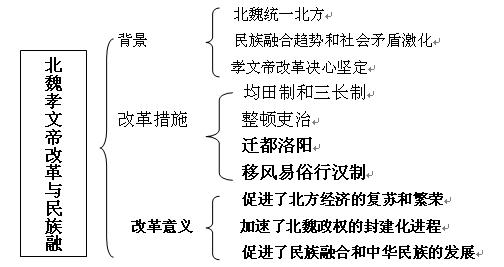(单词翻译:单击)
Reform by Emperor Xiaowen
孝文帝改革
Emperor Xiaowen implemented a drastic policy of sinicization,intending to centralize the government and make the multiethnic state more easy to govern.
孝文帝实施了彻底的汉化政策,想要使权力更加集中到中央政府并更好地管理这个多民族的国家。
These policies included changing artistic styles to reflect Chinese preferences and forcing the population to speak the language and to wear Chinese clothes.
这些政策包括按照汉人的喜好改变艺术风格,让人民说汉语、穿汉服。
He forced his own Xianbei people and others to adopt Chinese surnames, and changed his own family surname from Tuoba to Yuan.
他要求自己的鲜卑族民和其他人都采用汉人的姓氏,并将自己家族的姓氏“拓跋”改成了“元”。
He also encouraged intermarriage between Xianbei and Han.
同时,他还鼓励鲜卑族和汉族通婚。
In 494, Emperor Xiaowen moved the Northern Wei capital from Pingcheng(in modem Datong, Shanxi) to Luoyang, a city long acknowledged as a major center in Chinese history.
494年,孝文帝将都城从平城(今山西大同)迁至了中国历史上一个重要的中心城市——洛阳。
The shift in the capital was mirrored by a shift in tactics from active defense to passive defense against the Rouran.
都城的改变反映了在反抗柔然族的策略上从主动攻击到被动防守的转变。
While the capital was moved to Luoyang, the military elite remained centered at the old capital,
当都城迁至洛阳后,军事精英们却仍分布在旧都,
widening the differences between the administration and the military.
这进一步加大了政府与军队之间的差异。

The population at the old capital remained fiercely conservative, while the population at Luoyang was much more eager to adopt Xiaowen’s policies of sinicization.
旧都的人民依旧非常保守,而洛阳的人民则更乐于采纳孝文帝汉化的政策。
His reforms were met with resistance by the Xianbei elite.
孝文帝的改革遭到了鲜卑贵族们的反抗。
In 496, two plots by Xianbei nobles, one centered around his crown prince Yuan Xun, and one centered around his distant uncle Yuan Yi (元颐).
496年,鲜卑贵族成立了两个阴谋集团,一个以太子元恂为中心,另一个拥簇孝文帝的表叔元颐。
By 497, Xiaowen had destroyed the conspiracies and forced Yuan Xun to commit suicide.
到497年,孝文帝摧毁了阴谋集团并赐元恂自缢。
Unfortunate for Emperor Xiaowen, his sinicization policies had their downsides---- namely, he adopted the Jin Dynasty social stratification methods,
对于孝文帝来说不幸的是,他的汉化政策也存在副作用,换句话说,他采用了晋朝的社会分层法,
leading to incompetent nobles being put into positions of power while capable men of low birth not being able to advance in his government.
却导致将无能的贵族委以重任而有才能却出身低微的人无法在政途上取得进展。
Further, his wholesale adoption of Han culture and fine arts encouraged the nobles to be corrupt in order to afford the lifestyles of the Han elite, leading to further erosion to effective rule.
进一步来说,孝文帝对于汉文化与艺术全方位的接受使得贵族通过贪污腐败获得汉人贵族们的生活模式,这更加侵蚀了帝王的有效统治。
By the time of his grandson Emperor Xiaoming, Northern Wei was in substantial upheaval due to agrarian revolts,
到他的孙子孝明帝执政时,北魏由于农民起义已经处于实质上的动乱之中,
and by 534 had been divided into two halves, each of which would soon be taken over by warlords.
534年时,北魏分裂成两部分,很快,两部分都被领主所控制。


